Mulch is a must-have in many people’s gardens, but it can be dangerous if you have a dog, as not every mulch is mutt-friendly. Some include dyes, dangerous chemicals, and toxic ingredients, while others have scents that entice your pooch to chow down, risking stomach issues.
We’ll share some of the best mulches to use around dogs (and a few of the worst) below.
Best Dog-Safe Mulch Options: Key Takeaways
- Dog owners must be careful when using mulch in their yards and gardens. While some mulches are relatively safe for dogs, others can pose serious health concerns.
- Pine bark and cypress mulch are two of the best choices for families with four-footers. However, there are several other safe options, including cedar mulch and pine straw.
- No matter which mulch you choose, it’s important to prevent your dog from eating mulch. Even “dog-safe” mulches can cause intestinal obstructions and other health problems.
7 Best Dog-Safe Mulch Options
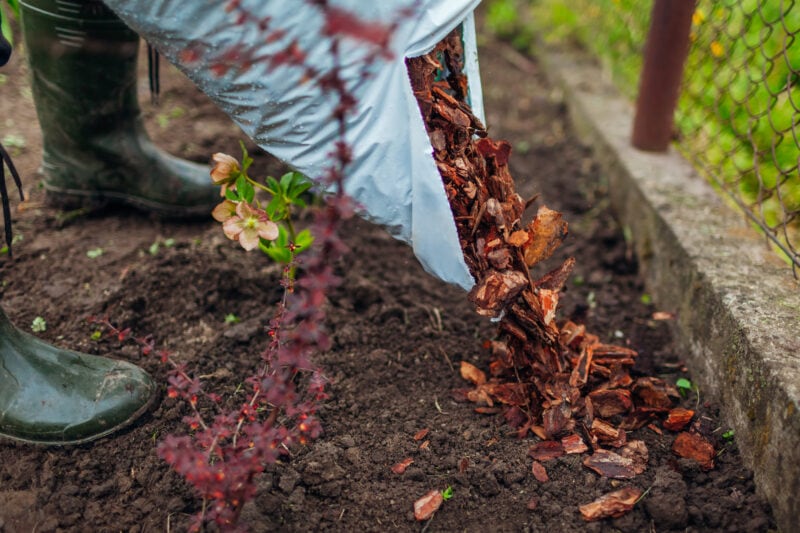
Dog-safe mulch comes in various looks and textures, making finding the right fit for your garden needs and aesthetic easier than you’d think. Check out these mutt-friendly mulches.
Pine Bark
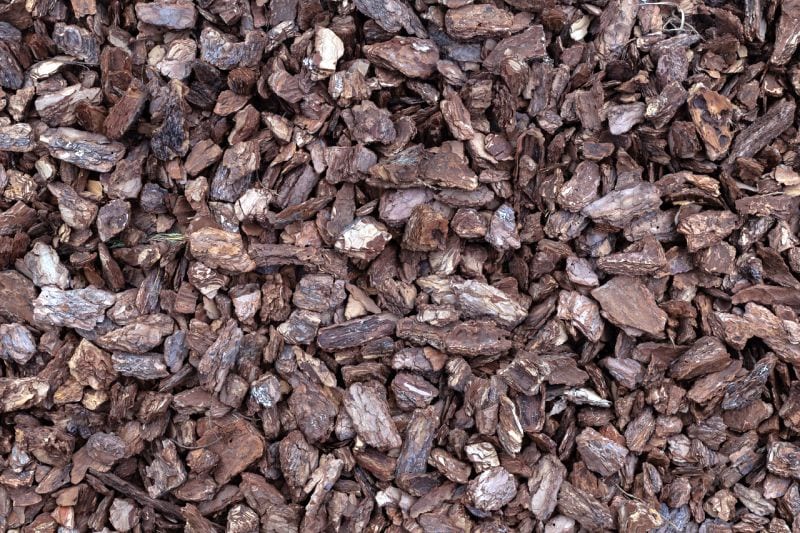
About: Made of shredded or chunked pine tree bark, pine bark mulch bears a natural eye-catching red-brown shade that works well with most garden palettes and won’t harm your pooch. Best of all, pine bark mulch is readily available around the U.S., and pine trees are fast-growing and quick to replenish, making pine bark one of the most affordable and sustainable mulches.
Pros
- One of the cheapest wood mulches available
- Doesn’t fade as fast as some mulch types
- More eco-friendly than other wood mulches
Cons
- Can wash away easily in heavy rains
- More acidic than other mulch options, potentially affecting your plants
Cypress
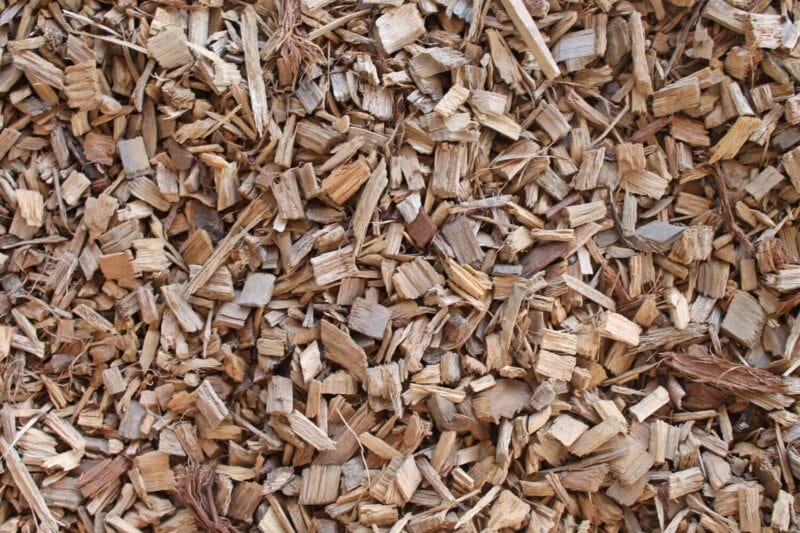
About: Cypress mulch is made of chipped or shredded wood and bark from bald and pond cypress trees harvested in the southeastern U.S. Featuring a soft, pleasant scent, cypress provides a degree of natural, dog-friendly protection against insects, though it can attract termites.
Pros
- Stays in place better than other wood mulches during rain
- Has a nice natural color that blends into most gardens with ease
- One of the more affordable mulches
Cons
- Doesn’t allow much water to absorb into the soil beneath
- Not the most eco-friendly wood mulch choice
- Color fades relatively quickly
Cedar
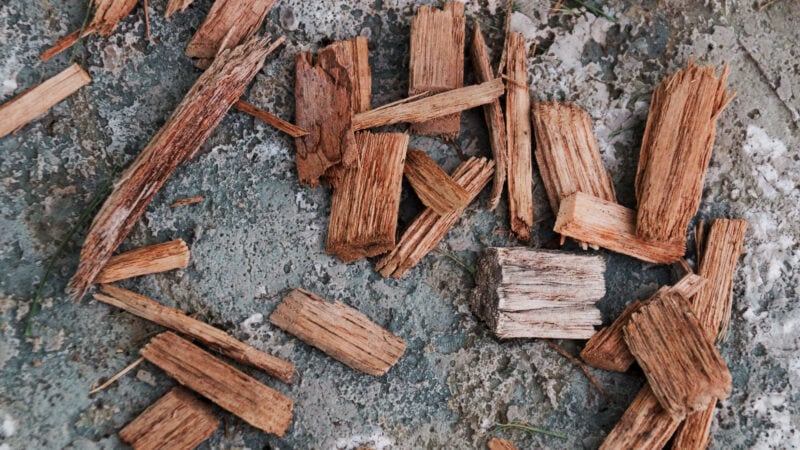
About: Made up of chunked cedar tree bark, cedar mulch typically isn’t treated with harsh chemicals, making it a good choice if you have a dog in your family. Some dyed varieties are out there, however, so always check the manufacturer’s information to ensure you’re getting a non-dyed, pup-friendly mixture.
Pros
- Rich red hue looks great in most gardens
- Smells great compared to most mulches
- Has natural, dog-safe insect-repelling properties
Cons
- On the pricier side
- Color fades fast
Pine Needle Straw
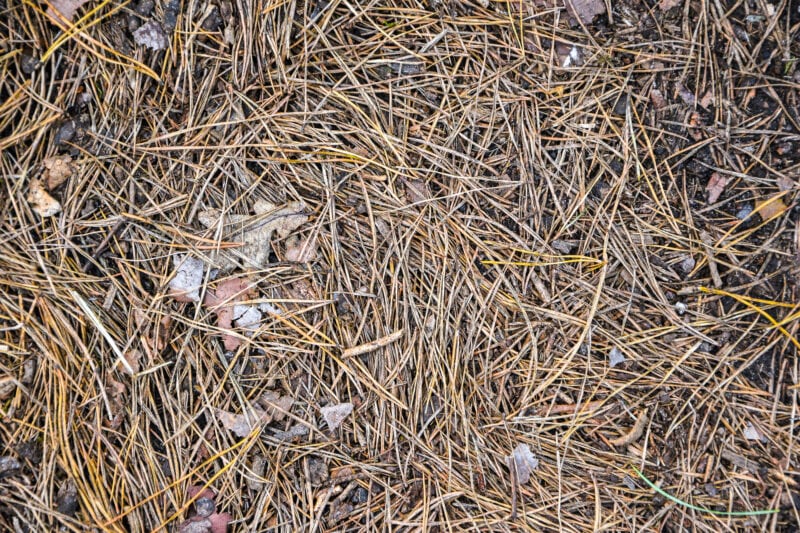
About: Pine needle straw isn’t a garden coverage option most people think of, but it’s a potentially dog-friendly choice you should consider if your dog isn’t prone to eating things he shouldn’t. Pine needles provide nutrients to the soil as they break down, but they can be too acidic for some plants.
Pros
- Easier to spread and shape around garden beds than heavier wood mulches
- Comes in a soft red-brown shade with no need for artificial dyes
- One of the most sustainable mulch options (very small carbon footprint)
Cons
- Can harm your dog’s stomach if ingested
- Pricier than traditional mulch options
- Doesn’t offer natural insect-repelling properties
Coco Mulch
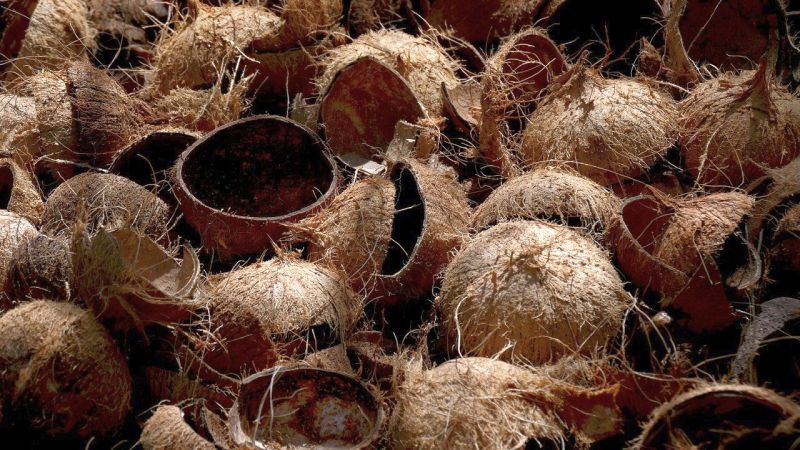
About: Not to be confused with dangerous cocoa bean mulch, coco mulch is made of coconut husks. Lighter than most wooden mulches, coco mulch retains water well and drains effectively, making it a popular choice for garden beds.
Pros
- Lightweight mixture is easy to work with
- Naturally discourages insects
- Contains a natural, lasting soft brown hue without harmful dyes
Cons
- More expensive than most mulches
- Contains fewer natural nutrients than other mulch varieties
Rock/Stone
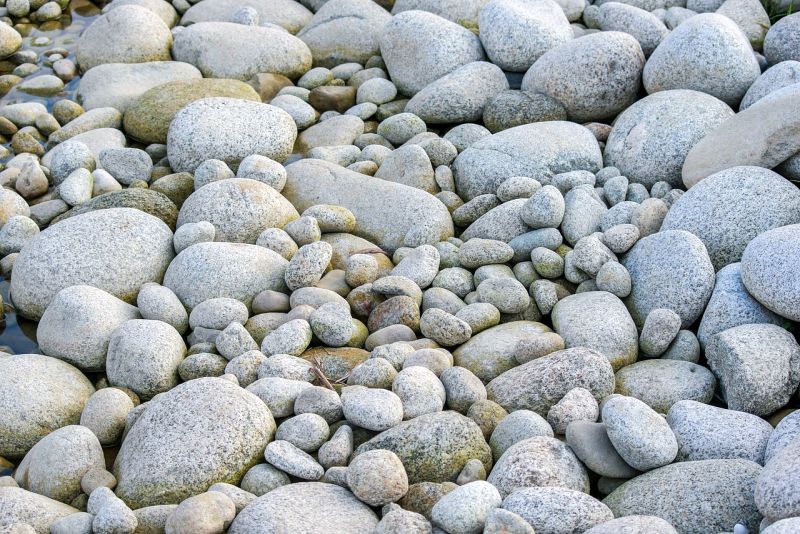
About: Laying rock or stone down in your yard or garden can lead to years-long coverage, blocking out weed growth without the need for harmful chemicals. Rocks typically aren’t targets for curious canine chompers, either (though there are exceptions).
Pros
- No dog-tempting decomposition scents
- Generally not chemically treated
- Won’t attract bugs or termites like wood mulch varieties
- More eco-friendly and long-lasting compared to traditional mulch
Cons
- Some dogs like eating rocks, which can be dangerous
- Heavier than other options
- Can lead to soil drying, inhibiting plant growth
Fir Bark
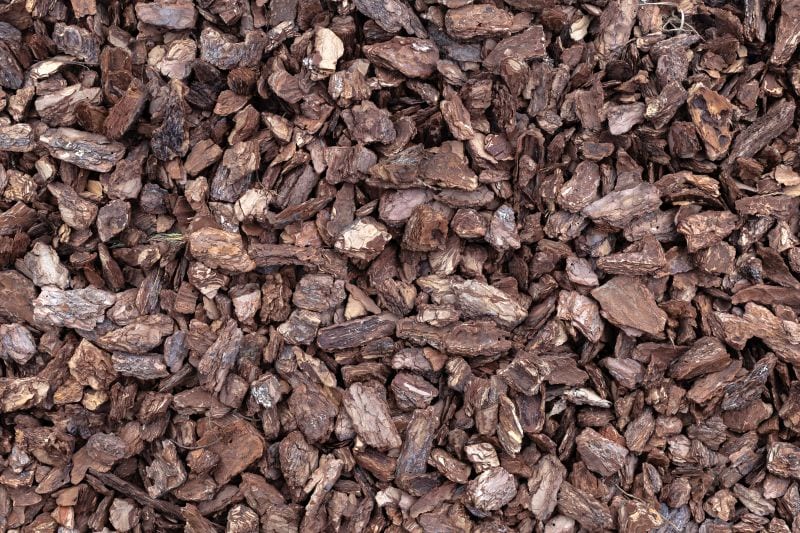
About: Fir bark mulch is made of conifer (fir) tree bark and offers natural water-resistance and weed protection without dog-harming chemicals. The larger cut of fir bark is less tempting for dogs to dig in, though stick-lovers may swipe a piece occasionally for chewing.
Pros
- Stays in place better than other wood mulches
- Soft natural color is chemical-free
- Longer lasting than traditional wood chip mulch
Cons
- Much more expensive than most mulch options
- Large chunked nature is tempting for chewers, risking mouth injury
Mulches to Avoid: 4 Mulches That Can Be Dangerous for Dogs
Unfortunately, countless dangerous ingredients are used in landscaping, and mulch is no different. Here are four mulches to avoid if you have doggos.
Eucalyptus Mulch
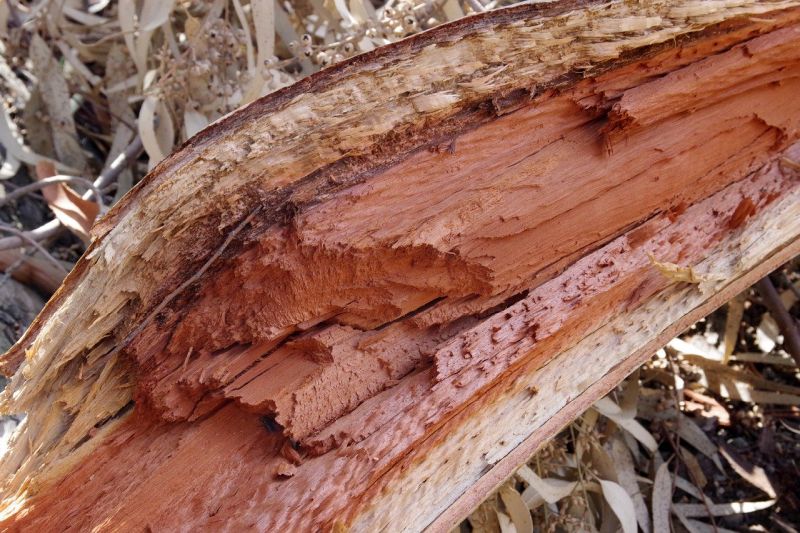
Eucalyptus mulch has a pleasant smell and features natural insect-repelling properties, which wins over many gardeners. But sadly, eucalyptus bark and leaves are toxic to dogs. Eucalyptus can cause vomiting, diarrhea, and other serious side effects if ingested.
Eucalyptus isn’t as long-lasting as other mulch options, nor is it as readily available stateside, making it pricier. Dog-safe solutions with a nose-pleasing scent and pest-repelling nature are cedar, pine bark, and coco mulch.
Dyed/Chemically Treated Mulches
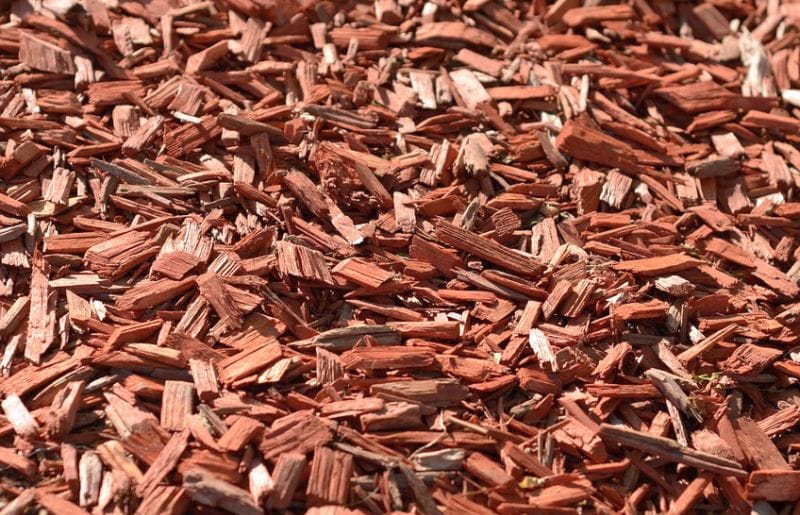
Various types of mulch are often dyed and chemically treated to achieve rich color, prevent weed growth, and repel insects. While these additions benefit your garden’s looks, they also put your dog at risk since many of these ingredients are toxic.
If you’d like rich color and natural insect protection in your garden, check out cedar mulch for a more pup-friendly solution.
Mulches Containing Salvaged Wood
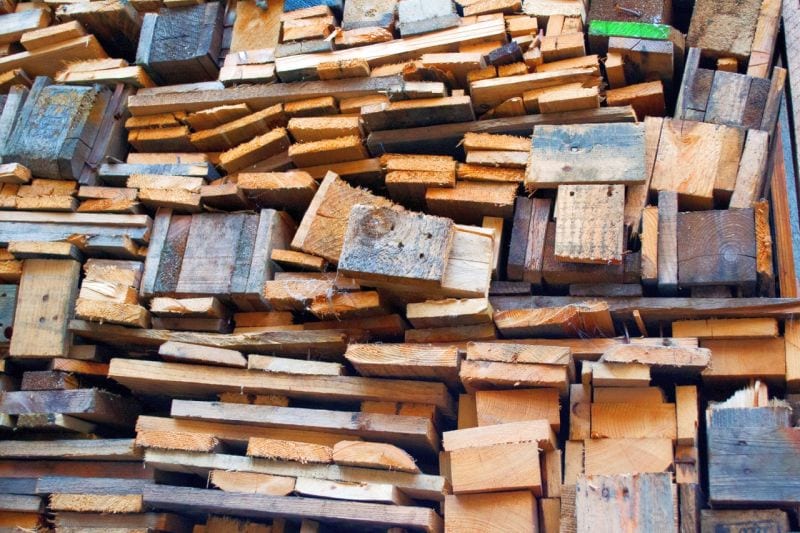
Mulches made with salvaged wood are among the cheapest options available, but they contain too many unknowns for pup parents to contend with. You don’t know what chemicals salvaged wood was subjected to during processing, potentially putting you and your four-footer at risk. Salvaged wood mulches don’t offer the best water penetration, either, potentially harming surrounding plants.
Any of the dog-safe mulches discussed earlier will make better, safer alternatives.
Cocoa Bean Mulch
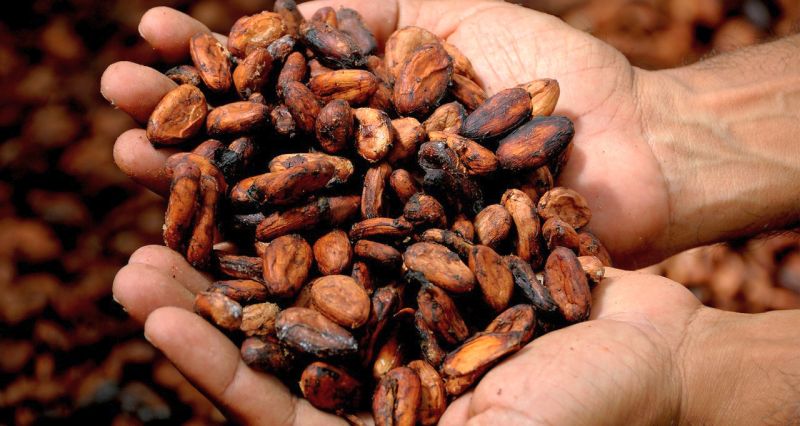
Featuring a cloyingly sweet smell and rich color, cocoa bean mulch is popular with gardeners, but this cocoa shell-derived product is toxic to dogs. Cocoa bean mulch contains theobromine, the same poisonous ingredient found in chocolate. Thanks to that sweet smell we mentioned, it’s also tempting for pups to eat, making it quite dangerous.
Comparable dog-safe mulches with pleasant aromas include cedar and pine bark.
Mulch & Garden Safety 101
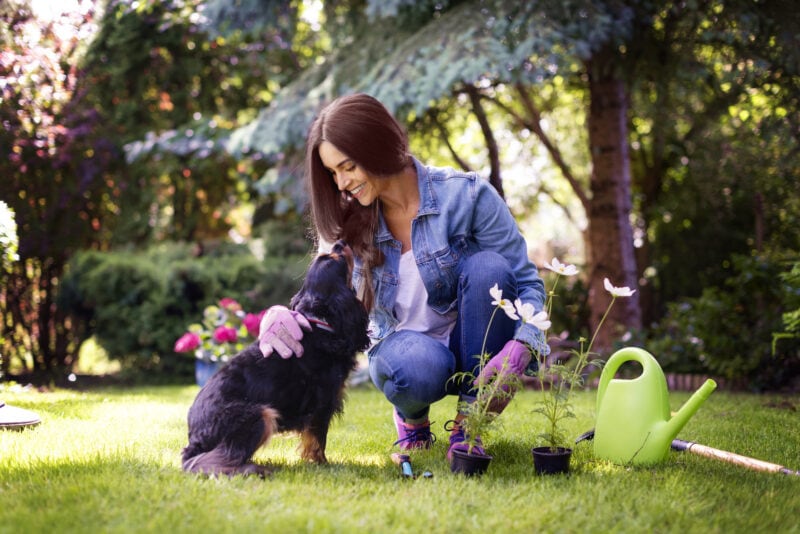
While we’ve included the best dog-friendly mulches on this list, your dog should never consume mulch, as every form poses a serious obstruction risk, regardless of ingredients. Not only does mulch risk blocking your dog’s digestive tract, but jagged edges can cause oral injuries and internal damage if swallowed.
Other dog-friendly gardening tips:
- Store gardening products and tools out of your dog’s reach.
- Investigate plants thoroughly before adding them to your garden, particularly flowers and fruit-bearing plants. There are plenty of beautiful dog-safe shrubs and dog-friendly yard plants available.
- Use pet-safe weed killers and dog-safe fertilzers.
- Always monitor your pooch around the garden.
- Avoid rodent-killing chemicals that can harm canines.
- Only use dog-safe pesticides.
- Clean up gardening debris and clippings regularly.
- Block access to dangerous plants, such as onions, garlic, and grapes.
- Compost in dog-free areas.
Thinking about seeding your yard or throwing down some new sod? Be sure to check out our article about the best grass for dogs.
Grass typically doesn’t represent much of a safety concern for our pooches, but some varieties will stand up much better to the wear and tear dogs can inflict.
Signs of Poisoning in Dogs
Gardening with your doggo is a great way to bond and soak in fresh air and sunshine, but the wrong products can leave your floof in a load of trouble. Carefully research plants, gardening products, and chemicals before introducing them to your garden, and never let your dog eat anything you’re not 100% sure is dog-safe.
Watch out for these signs of poisoning in dogs:
- Vomiting
- Diarrhea
- Lack of appetite
- Restlessness
- Heavy panting
- Staggering/falling
- Excessive drooling
- Seizures
If you know what your dog ate, give the ASPCA Pet Poison Hotline a call along with your vet. Never take the “wait and see” approach with poison, as time is of the essence for treatment.
Signs of Digestive Obstruction in Dogs
Some dogs can’t help but eat things they shouldn’t, leading to a digestive obstruction. As the name implies, a digestive obstruction is a partial or total blockage in the digestive tract, usually in a dog’s stomach or intestines.
An obstruction prevents solids and liquids from moving through the digestive tract, ultimately cutting off blood flow to the area, causing serious harm, including irreversible tissue death.
Signs of a stomach obstruction in dogs include:
- Vomiting (often repetitive, sometimes unproductive)
- Diarrhea
- Loss of appetite
- Restlessness
- Whining
- Excessive drinking
- A hunched, uncomfortable posture
As with poisoning, digestive obstruction in dogs isn’t something to treat at home or wait out. Call your vet right away.
Dog-Friendly Mulch FAQ
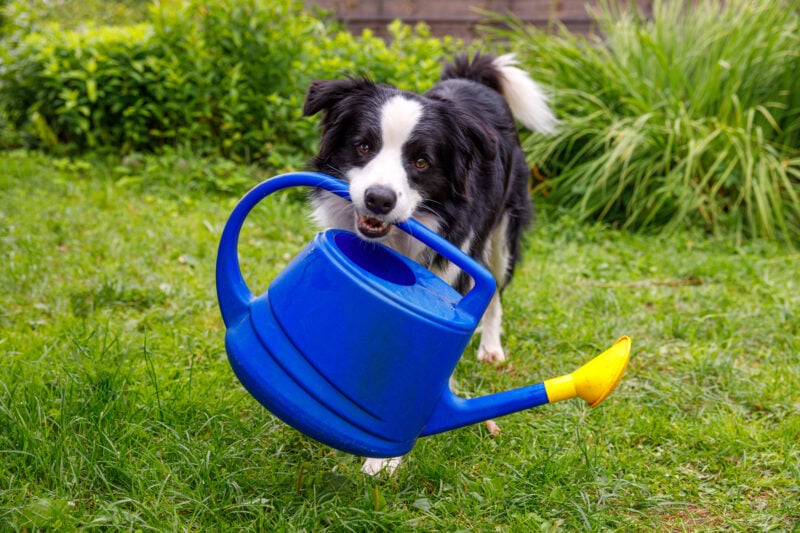
You might still have some questions surrounding mulch and dog-safe options. Check out the most commonly asked questions and answers about dog-safe mulch.
Why do dogs eat mulch?
Dogs may eat mulch because of its smell since it often contains composted materials that can be a sensory smorgasbord to canines. Other mulches bear a sweet smell reminiscent of food, like cocoa bean mulch.
Is mulch dangerous to dogs?
Yes – it can be. Mulch can be dangerous to dogs since it often contains toxic ingredients, including pesticides. It may also feature pieces with sharp edges that can injure your dog’s paws, mouth, and intestines if ingested. Your dog may suffer a digestive obstruction as well if he eats mulch.
Can you use mulch in a dog run?
Dog-safe mulch can be used in a DIY dog run, but it tends to “escape.” Also, you’ll have to be mindful of the safety issues discussed above.
Does mulch repel fleas and insects?
Some types of mulch naturally repel pests, including fleas and insects, while others use pesticides to get the job done. For a dog-safe solution, aim for pesticide-free mulches, such as cedar mulch.
Where can you buy dog-safe mulch?
You can buy dog-safe mulch at your local lawn and garden store. Ideally, you want to look for the Mulch & Soil Council (MSC) certification seal on a product before purchase, ensuring the mulch contains no arsenic-containing wood. Looking for an organic label is also helpful, as these mixtures cannot contain any pesticides or weed killers.
What about rubber mulch?
Rubber mulch is often treated with chemicals, so we wouldn’t recommend it for use around dogs. Rubber mulch is also similar to materials used in dog toys, sometimes enticing your dog to chew or ingest it, risking obstruction.
***
Do you use any of the dog-safe mulches on our list? Another? Have any dog-safe gardening tips for other pup parents? Share with us in the comments. We’d love to hear!
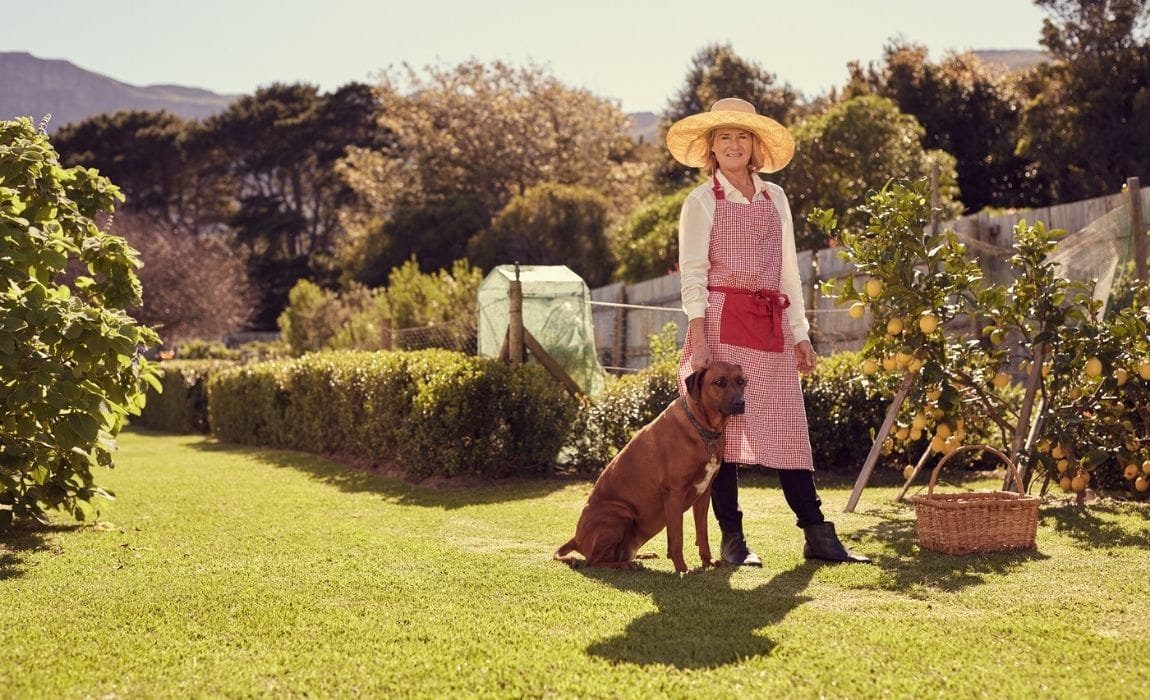

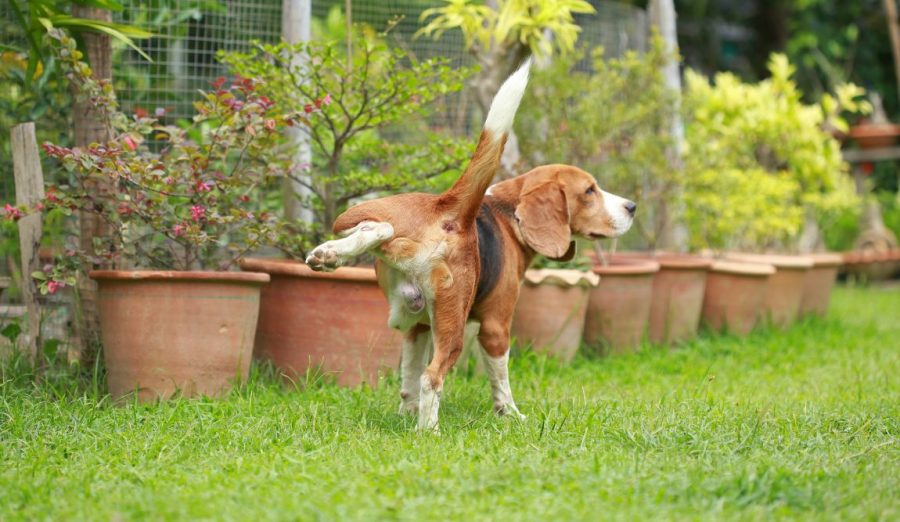




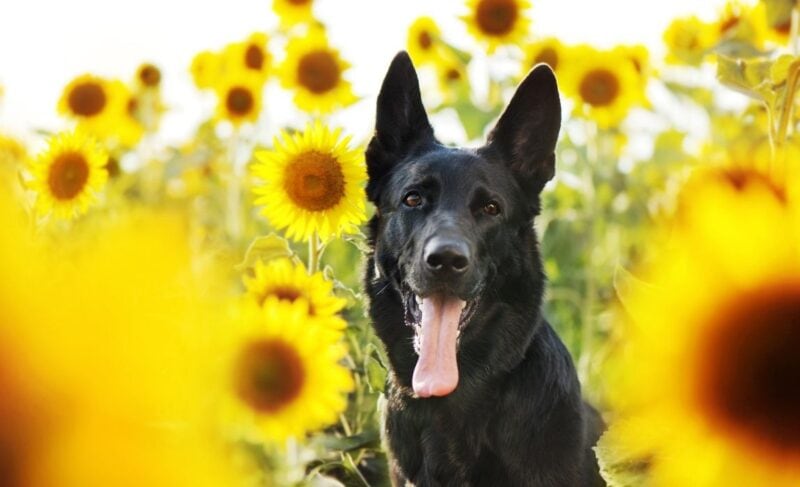
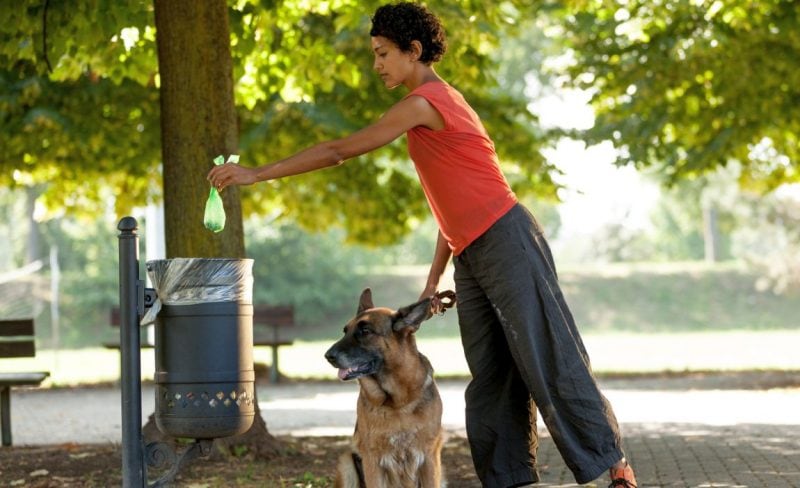
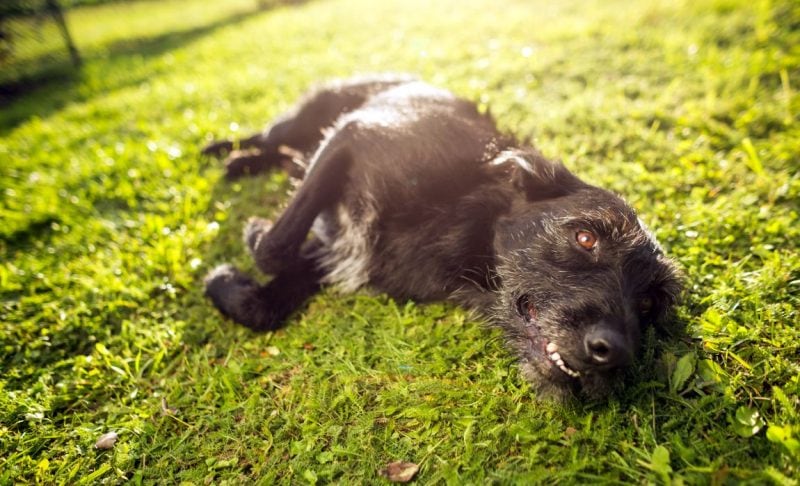
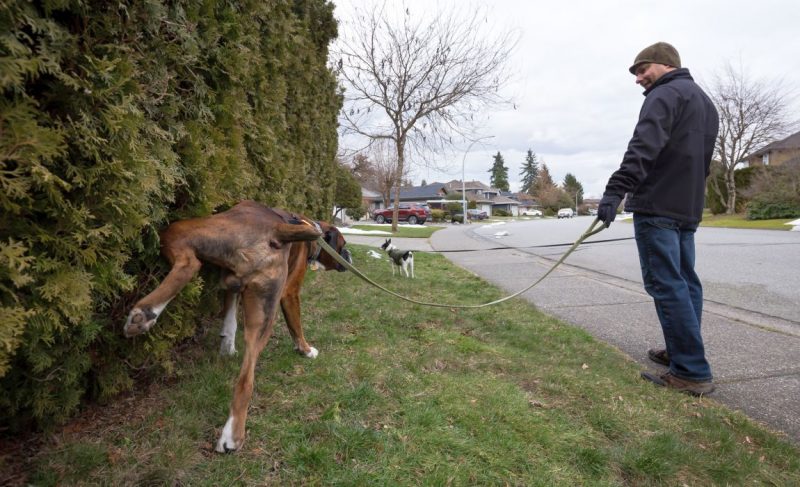
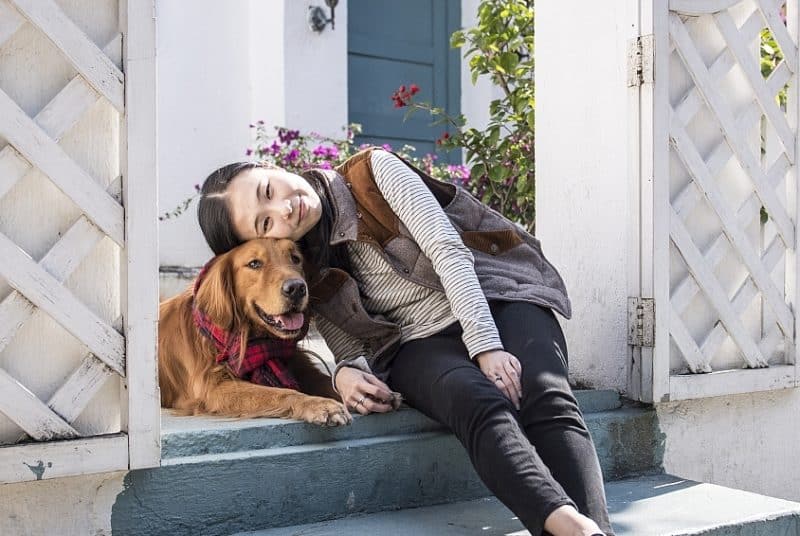

Leave a Comment